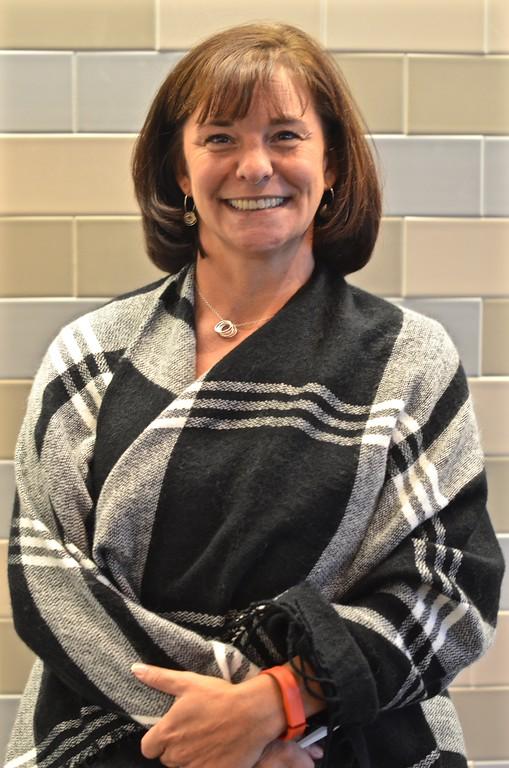New wellness teacher Rachel Hanks updates curriculum
Credit: DAVID LIN
Featured above is wellness teacher Rachel Hanks. Hanks is working to establish a new wellness curriculum for juniors and seniors. “We’ll be talking about choosing to have sex or not choosing to have sex, saying no and all those kinds of things, especially with drugs and alcohol,” Hanks said.
December 15, 2015
This year, new wellness teacher Rachel Hanks is working to establish a new wellness curriculum for juniors and seniors.
The seniors’ new class focuses on drugs and alcohol as well as LGBTQ issues. Hanks surveyed this year’s seniors and asked what they most wanted to learn about to develop this year’s curriculum.
“We’ll be talking about sexual orientation. We’ll be talking about consent,” Hanks said. “We’ll be talking about choosing to have sex or not choosing to have sex, saying no and all those kinds of things, especially with drugs and alcohol.”
Hanks is working with the Alliance Club to develop curriculum about sexual orientation and LGBTQ issues. Her classes will likely be watching Put it On the Map. This movie features 29 LGBTQ youth or allies from Seattle suburbs, talking about their personal experiences.
Hanks’ seniors voted to also talk about legalizing drugs. Past classes focused on alcohol and marijuana, and class projects and activities try to acknowledge both sides of legalizing substances. She wants her classes to explore different points of view. Hanks teaches through conversation rather than lecture.
“Really it’s like a circle of talk,” Hanks said. “We’re just talking, not judging. That’s what I’m hoping, that it’ll be a place to have a conversation and not feel so lost.”
Hanks says it’s important for students to have these conversations now to practice addressing uncomfortable topics later in life.
Juniors will also be tackling difficult conversations. During third quarter, juniors will take the Mentors Against Violence program. The program focuses on dating violence. Male and female students will take the MVP class together third quarter. Then, during fourth quarter, classes will split by gender. For years, girls have taken Rape Aggression Defense while boys took wellness in the gym. Now, while girls take R.A.D., boys will take a class with Ms. Hanks, focusing on consent.
“A couple of parents had called, and they were upset because the girls were taking R.A.D., and the boys were lifting weights,” Hanks said. “I said ‘I get that,’ especially because that would be my son, so I said ‘I just came from an all boys’ school, I’ll take them. Just give me all the boys, and we’ll talk about sexual harassment, we’ll talk about dating violence, we’ll talk about coercion. We’ll talk about alcohol and drug use. Let’s do it.’ I’m really excited.”
Hanks came to Wayland High School after teaching at the all boys Catholic high school Xaverian Brothers. According to Hanks, students often feel more comfortable talking about rape, sexual harassment, and consent when they are not in co-ed groups.
Hanks thinks that having a woman teach the boys’ course will show male students another perspective. She wants young people to acknowledge that men can be sexually harassed and raped, and that women are just as important as men. Hanks hopes to teach students to make decisions based on what is important to them rather than their gender.
“It’s about having confidence in who you are for any gender,” Hanks said. “That you are confident in your decisions and that you are staying true to your own values.”
Hanks wants students to have a good relationship with her so they can feel comfortable discussing personal topics. She tries to be accessible for students who need to talk to her.
For Hanks, it’s important that the curriculum is student-driven. She pays attention to suggestions and tries to incorporate what students need most into her classes.
Many of Hanks’ philosophies come from her education and the time she spent as a social worker. She claims that having difficult conversations has helped her become a better teacher and person.
“I was certified in guidance, but I really like talking about drugs and sex,” Hanks said. “I’ve worked with incarcerated youth. I’ve worked with people in low income housing. I’ve worked with people that run the gamut of a thousand things, and I think they’re the people who have taught me how to do a thousand things just by listening and hearing and having a conversation.”
Hanks says she is grateful to have the freedom to adjust the wellness curriculum in Wayland and has enjoyed her first few months here.
“The kids are great, and I enjoy coming to school,” Hanks said. “My door is always open if people have questions or want to talk about the curriculum or say, ‘Hey we need to do this!’ or whatever, you know. I’m around.”





![Last Wednesday, the Wayland School Committee gathered to discuss a number of topics regarding the health curriculum and Innovation Career Pathway course. Another large topic of conversation was the ways to potentially mitigate distracting cell phone usage. "These [phones] are going to distract your learning and social relationships," Superintendent David Fleishman said. "That's concrete right there."](https://waylandstudentpress.com/wp-content/uploads/2025/06/Screenshot-2025-06-04-at-9.49.31 PM-1200x886.png)



























![Troy Hoyt finishes the Boston Marathon, running for the Hoyt Foundation. T. Hoyt is the son of Hoyt Foundation CEO Russ Hoyt.
“[Running a marathon] might seem like a big thing, when it’s presented to you at first, but if you break it up and just keep telling yourself, “Yes, you can,” you can start chipping away at it. And before you know it, you’ll be running the whole 26 miles, and you won’t even think twice about it.” T. Hoyt said.](https://waylandstudentpress.com/wp-content/uploads/2025/04/C36E8761-1CBB-452E-9DF2-543EF7B1095E_1_105_c.jpeg)












































